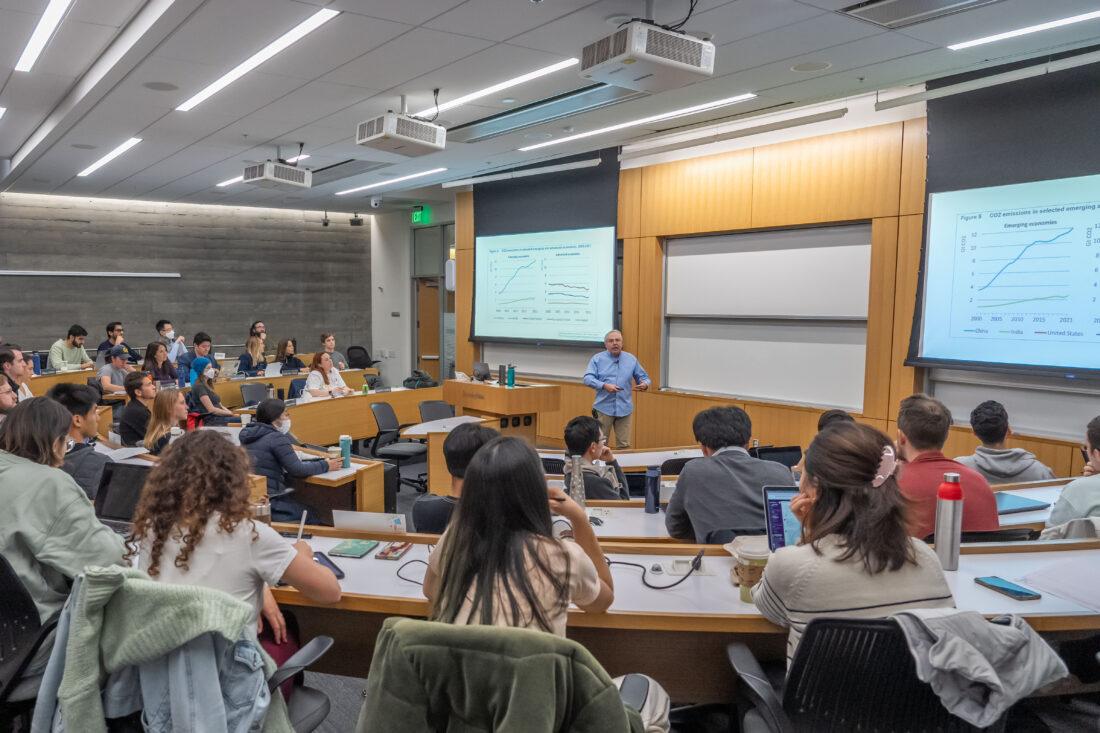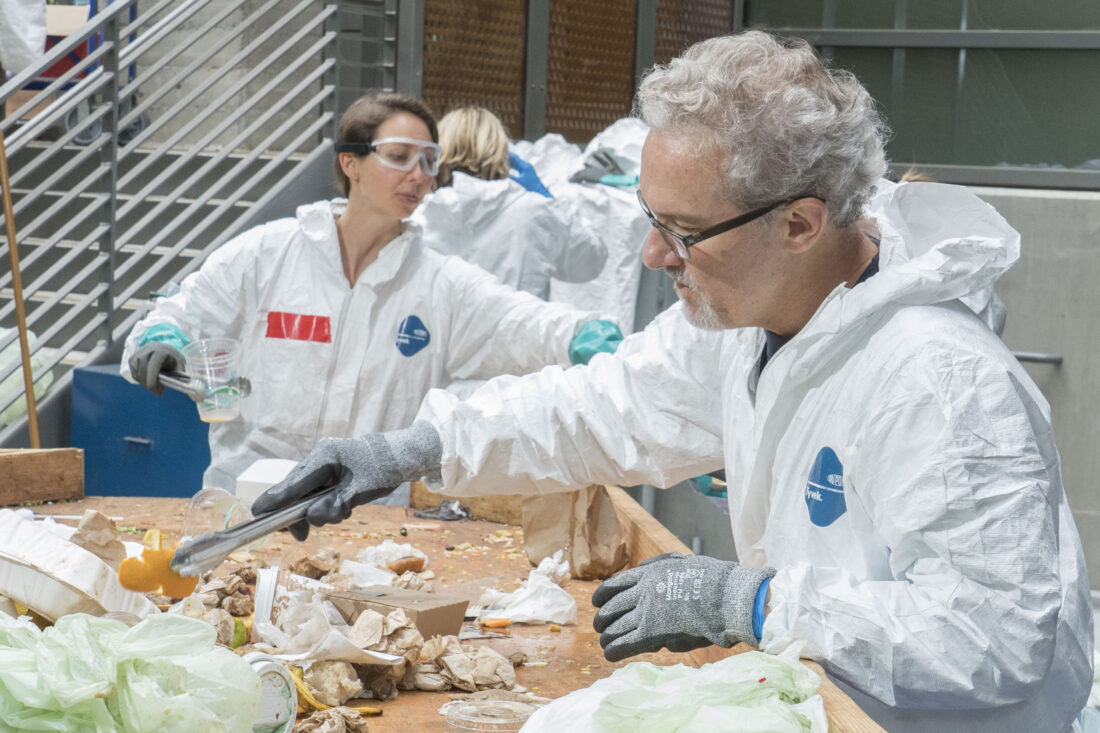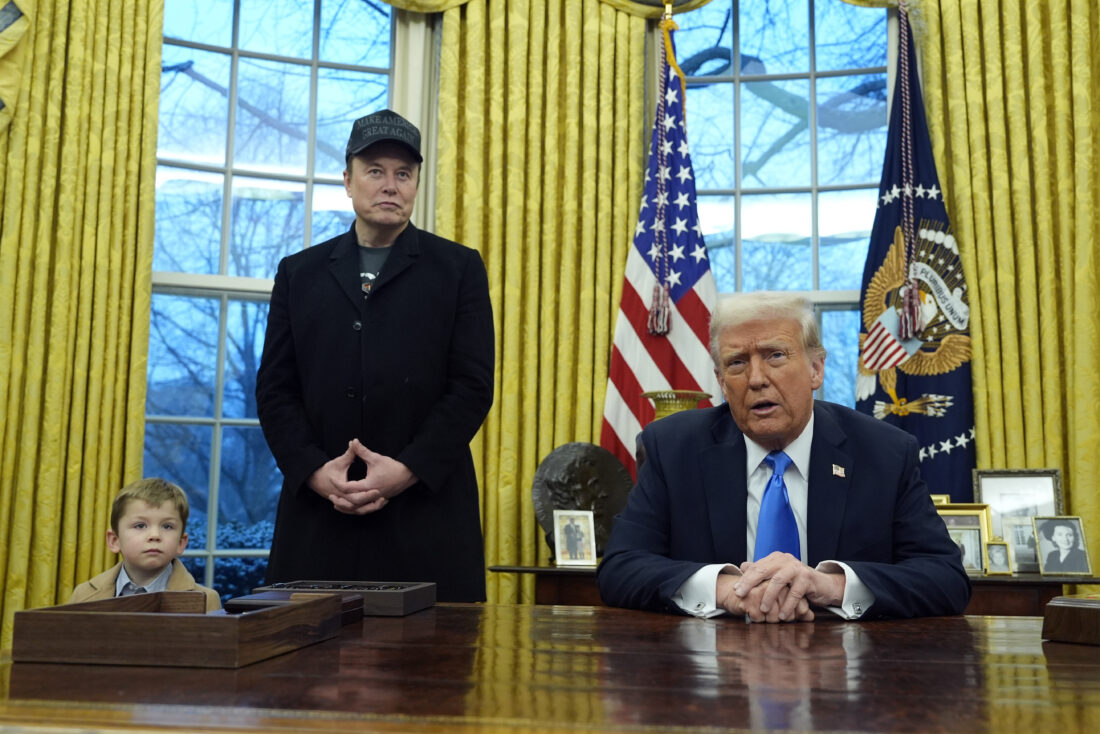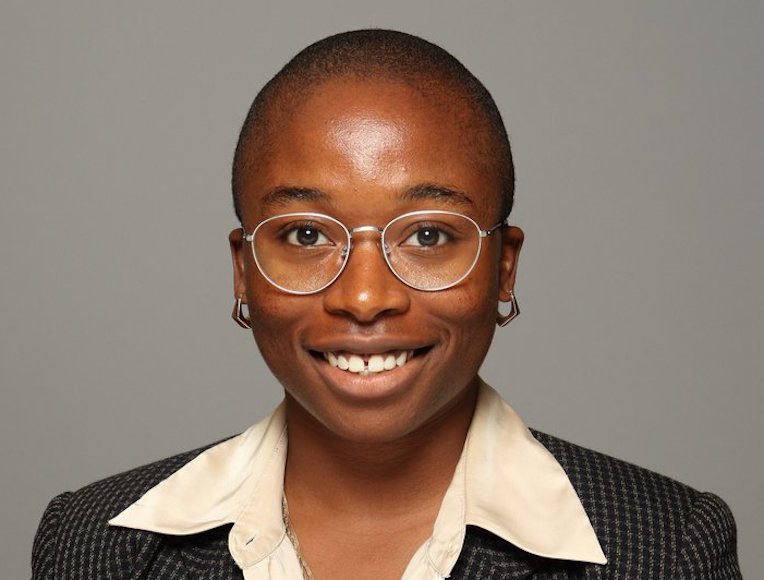Summit energizes hundreds of MBA students to lead climate innovation

Berkeley Haas Professor Ann Harrison and her friend Michele de Nevers hiked through the French Alps in the summer of 2023 to view the Mer de Glace glacier. They were left speechless by the large expanse of darker rock in the wake of the glacier—a visible marker of rising temperatures.
“Last year was the hottest year in recorded history,” says Harrison, the former dean of Berkeley Haas and a renowned economist. “Given that 25% of graduate students are in the discipline of business, we have a huge responsibility and opportunity to educate business students about the opportunities to fight and adapt to climate change.”
In a new article published in the journal California Management Review, Harrison and de Nevers, former Haas chief sustainability officer, joined with Haas Sustainability Director Katherine Baird to lay out a roadmap for how business schools can equip tomorrow’s business leaders to take on these challenges.
“The climate challenge provides not only unprecedented threats to business as usual, but massive opportunities,” they write in a new article. “The x-factor that just may tip the balance in favor of success is the passion of young people who want to create a better future for themselves, their communities, and their planet.”
“The x-factor that just may tip the balance in favor of success is the passion of young people who want to create a better future for themselves, their communities, and their planet.”
—Ann Harrison, Michele de Nevers, and Katherine Baird
Here are five ways the authors say Haas is leading the way in training leaders who can tackle these issues head-on and what other schools can learn from them.

1. Providing a strong foundation in climate research. Haas faculty are at the forefront of sustainability research, ensuring that climate solutions are rooted in data and real-world application.
For example, research by professors Nancy Wallace and Richard Stanton on wildfire and real estate risk exemplifies Haas’ commitment to producing research that informs policy and financial decision-making. Meanwhile, professional faculty member Andrew Isaacs‘ course on Climate Change and Business Strategy provides students with a scientific foundation to evaluate corporate sustainability efforts and climate risk.
To build on this, Haas has made faculty engagement in climate issues a priority, with 36 faculty members involved in sustainability research—one of the highest among top business schools. By investing in faculty leadership, Haas ensures that climate education is grounded in cutting-edge research, empowering future business leaders with the best available knowledge.
“The research that our faculty are doing is really at the forefront of some of the big questions that leaders in the workplace and in business have about how to tackle and incorporate things like climate risk, externalities, insurance pricing, and wildfire mitigation,” Baird says. “These are all concepts that business leadership is really grappling with, and our faculty research is providing them with answers and solutions.”
Watch a video of coauthor Michele de Nevers discussing the article:
2. Embedding sustainability into the core curriculum. Haas recognizes that sustainability must be woven into all aspects of business education, not just as an elective. To that end, the school has undertaken a multi-year effort to integrate climate and sustainability topics into core courses across finance, operations, accounting, economics, and marketing. The goal is for every Haas graduate to be climate-literate, understanding how sustainability intersects with core business functions.
Beyond individual courses, Haas offers specialized programs for students who want to deepen their expertise. For instance, the Michaels Graduate Certificate in Sustainable Business provides a structured pathway for MBA students to focus on climate issues.
Additionally, the MBA/Master of Climate Solutions (MCS) joint degree, which enrolled its first students in fall 2024, prepares professionals to lead climate strategy, carbon accounting, and clean technology investments.
These specialized tracks ensures that students not only learn about climate issues but also gain the practical skills to tackle them in the workforce.
“We believe that an understanding of climate change and sustainability is a core business leadership competence in 2025,” Baird says.
3. Providing hands-on learning through impactful programs. Haas goes beyond classroom learning by providing opportunities for students to engage in real-world sustainability challenges.
The pioneering Cleantech to Market (C2M) program pairs MBA students with climate startups, helping bring cutting-edge clean energy solutions to market. Since its launch in 2008, the program has supported over 44 startups, many of which have gone on to raise millions in funding.
Similarly, Haas’ Sustainable and Impact Finance (SAIF) initiative was ranked the top sustainable finance program in the U.S. by the Wall Street Journal. Through SAIF, students gain hands-on experience in impact investing, sustainable portfolio management, and evaluating ESG (environmental, social, governance) risks.
The newest addition to this initiative is the Haas Climate Solutions Fund, a $2.36 million investment fund managed by MBA students to support climate-focused ventures.
These experiential programs ensure that Haas graduates don’t just learn about sustainability in theory: They leave with the ability to drive investment in climate solutions, scale sustainable business models, and create measurable impact.
“Our students are investing real money, sourcing real startups in the climate and sustainability spaces through these courses,” Baird says. “They’re gaining skills, contacts, networks, and experience that they can then go and use in their roles and in their jobs after graduation.”

4. Walking the talk on institutional change: Haas has also embedded sustainability into its own operations, ensuring that the school practices what it teaches. The school was the first to commission an independent carbon footprint inventory and has committed to transitioning to 100% renewable energy. Chou Hall, a landmark Haas building, was the first zero-waste academic building in the U.S., earning LEED Platinum and TRUE Zero Waste certification.
Rather than treating sustainability as a separate initiative, Haas has fully integrated it into its core institutional structure—just as businesses must do to remain competitive in a rapidly changing world. In 2023, the school created the Office of Sustainability and Climate Change, centralizing sustainability efforts across research, curriculum, and operations. The office is led by Chief Sustainability Officer Amy Chan, BS 06, who helped drive key sustainability initiatives across Apple’s supply chain for over a decade.
“By looking at our own operations, we can really showcase to other educational institutions, other businesses and to our students what it means to run an organization in a sustainable way in 2025,” Baird says.
5. Preparing the next generation of climate leaders. Beyond its own campus, Haas plays a leadership role in shaping climate education at the national and global level. The school is an active participant in the UN Principles for Responsible Management Education (PRME) initiative, helping set global standards for sustainability education in business schools.
Haas’ approach is clear: Business leaders must be at the forefront of solving the climate crisis, and it is the responsibility of business schools to train them accordingly. By embedding sustainability across research, curriculum, hands-on learning, and institutional leadership, Haas has built a roadmap for educating climate-conscious business leaders who are prepared to take on the world’s most pressing environmental challenges.
“Climate change is a global challenge. The sustainability transformation has to happen at all levels of education, society, and business,” Baird says. “So, we want to partner with other business schools to see that happen in business education across the country.
A Scalable Model for the Future
The Haas roadmap offers a model for other business schools to follow. Through faculty leadership, curriculum transformation, hands-on learning, and institutional change, Haas is proving that business education can be a powerful force in addressing the climate crisis. As more institutions adopt similar strategies, the next generation of business leaders will be better equipped to drive the systemic change needed to create a more sustainable future.
To that end, Haas is hosting more than 500 MBA students from top business schools across the country for the 2025 ClimateCAP Summit Feb. 28 – March 1.
“This is an opportunity for for students and other educators to come together and ask: What is the role of business schools and business students in leading the sustainable transformation?,” Baird says. “We think our roadmap will help provide answers.”
Posted in:
Topics:




